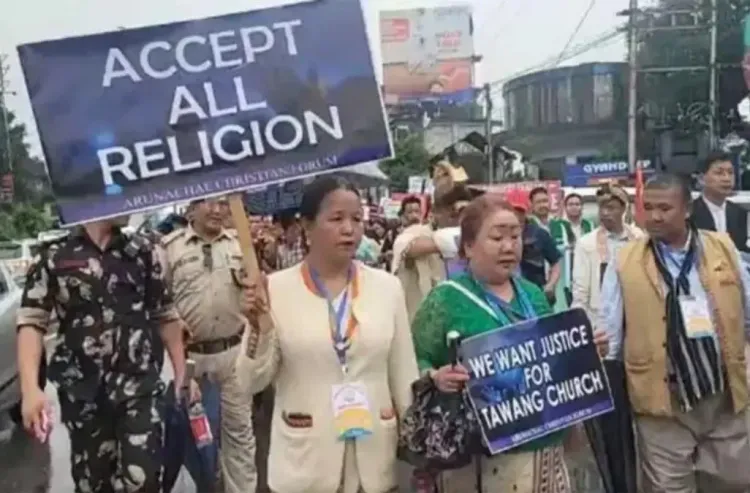Arunachal Christian Group to Stage Hunger Strike Against 1978 Anti-Conversion Statute

Synopsis
Key Takeaways
- ACF's hunger strike to last eight hours.
- Protest against Arunachal Pradesh Freedom of Religion Act implementation.
- ACF plans to gherao state Assembly on March 6.
- Chief Minister Pema Khandu's announcement raises concerns.
- ACF argues the Act undermines religious freedom.
Itanagar, Feb 16 (NationPress) Members of the Arunachal Christian Forum (ACF) are set to engage in an eight-hour hunger strike on Monday as a stand against the enforcement of the Arunachal Pradesh Freedom of Religion Act (APFRA), 1978.
ACF President Tarh Miri stated that the protest will continue until 5 p.m. on Monday at the Nyishi Indigenous Identity Society Nyokum ground in Borum village, marking a significant step in their democratic movement against the state BJP government’s efforts to implement a 46-year-old anti-conversion law.
Participation from some legislators who identify as Christian is anticipated in this hunger strike organized by the ACF.
Earlier this month, the ACF announced a series of protests following a declaration by Chief Minister Pema Khandu that the Arunachal Pradesh Freedom of Religion Act, 1978, which has remained inactive until now, would soon have its rules established and enforced in the state.
This announcement from the Chief Minister follows a directive from the Itanagar bench of the Gauhati High Court, which instructed the state government to finalize the draft rules of the Act within six months starting September 2024.
Despite the ACF's announcement of protests against the law's implementation, the Chief Minister has expressed the government's willingness to discuss the matter further and assured that the proposed rules under the Act do not target any religious group.
President Miri mentioned that they plan to gherao the state Assembly on March 6, coinciding with discussions regarding the Act before its potential implementation.
He argued that although the law claims to promote freedom, it is designed to restrict the ability to practice their faith.
“We have organized this protest to voice our dissent against an Act that has been inactive for over four decades,” Miri stated, emphasizing that the state government has largely ignored the ACF’s concerns regarding this longstanding law.
He noted that they had previously engaged in discussions with the Chief Secretary in November of the previous year and submitted a letter to Chief Minister Pema Khandu.
The Chief Minister had recommended that they consult with his advisor, Alo Libang. Miri claimed that the push for the Act’s implementation contradicts the essence of secularism.
In December of the last year, the Chief Minister reiterated that the Freedom of Religion Act would be enforced following the establishment of its rules.
Initially passed by the state Assembly under the Janata Party-led government led by then Chief Minister P.K. Thungon, the Arunachal Pradesh Freedom of Religion Act received presidential assent on October 25, 1978, aiming to prohibit conversions between religions through coercion, inducement, or deceit.
This legislation was reportedly enacted in response to worries regarding the perceived risk to indigenous religions within the state. Nevertheless, successive administrations have chosen to overlook the Act.










